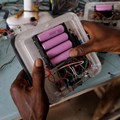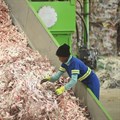Pollution has a negative effect on the earth's natural resources, and waste management interventions should be implemented to assuage further harm to the environment.

Luanda Madikizela, founder of Lundstar
While society understands the importance of recycling, many tend to turn a blind eye. This lack of recycling in South Africa inspired entrepreneur Luanda Madikizela to start a waste management business called Lundstar.
“I was shocked when I realised that people don’t recycle and that many don’t care about preventing pollution and reducing the amount of waste that ends up in landfills,” he said. His love for the environment and concern for lack of waste management interventions prompted him to start a social impact business.
Food and electronic waste management
The consumer-driven world we live in results in a continuous waste accumulation cycle. Lundstar provides comprehensive waste management services with a core focus on food waste recycling and electronic waste (e-waste) management.
According to a report by the WorldWide Fund for Nature South Africa, Food Loss and Waste: Facts and Futures, South Africans waste one-third of all food in the country and this is roughly 10-million tonnes of food annually. This is an alarming figure considering many people are struggling to access food.
Angela Ukomadu 13 Oct 2022 To address this challenge, Lundstar offers a food waste recycling service which converts food waste into compost that can be used to fertilise the soil and grow crops. By collecting food waste from domestic and commercial kitchens, they ensure the waste no longer piles up in general waste bins which leads to increased pest pollution and waste odours.
“Most of South Africa’s waste management systems are outdated and not in touch with today’s waste patterns and increased demand,” Madikizela said.
Electronic waste which is the discarding of electrical and electronic devices is regarded as the fastest growing waste stream in the world. Thousands of televisions, laptops and cellphones are thrown away each year and solutions must be found to address this challenge.
Many discarded electronic devices usually have parts that still can be reused. Lundstar focuses on recovering the parts within the devices that still have value and selecting metals that can be used to make new products.
“Our electronic waste is stripped and sorted for recycling, upcycled or disposed of in an environmentally friendly process,” he added.
Creating a positive impact
Madikizela’s business employs young people from disadvantaged backgrounds, and they work together to find innovative ways to recycle and reuse waste. “I’m happy to be creating jobs and empowering young people with waste management skills and knowledge.”
Apart from that, the business also contributes towards economic growth. Madikizela believes that it’s cost-effective to use recycled materials to make new products and this decreases the need to harvest raw materials to make new products.
Waste management businesses are important because they assist in preserving natural resources, reduce climate-changing carbon emissions and create employment.
The reduce, reuse, and recycle campaign is slowly gaining momentum and urgent interventions need to be implemented to ensure everyone is on board. Entrepreneurs in the waste sector are working hard to reduce waste and combined efforts from the government and communities can help them create a bigger impact.












































